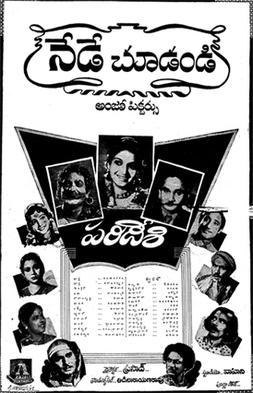Top Qs
Timeline
Chat
Perspective
Paradesi (1953 film)
1953 film by L. V. Prasad From Wikipedia, the free encyclopedia
Remove ads
Paradesi or Poongothai is a 1953 Indian Telugu-Tamil bilingual romance film, produced by P. Adinarayana Rao under the Anjali pictures banner and directed by L. V. Prasad.[1] .This is actually the first film acted by Sivaji but Parasakthi came first.It stars Akkineni Nageswara Rao, Anjali Devi, and Sivaji Ganesan with music composed by P. Adinarayana Rao. The film is a remake of the Hindi movie Raj Rani (1950). Paradesi was an average grosser at the box office.[2] No print of Poongothai is known to survive, making it a lost film.[3]
Remove ads
Remove ads
Plot
Summarize
Perspective
The film begins at a hill station, Sitagiri, where a benevolent florist girl, Lakshmi, resides with her disabled father, Rangaiah. Chandram is the son of an industrialist who died of bankruptcy. Realizing this, Chandram's friend Raghu entrusts his wife Susheela, and son Anand to him before breathing his last. Thus, to oversee them, he strives hard and sickens. At the suggestion of his Doctor, Chandram goes to Sitagiri to unwind. He endears Lakshmi's pure soul therein, and the two are covertly knit in the Povvulamma temple. Next, Lakshmi conceives and informs Rangaiah about her splice with a Paradesi. Then, he rebukes and coerces Lakshmi to get him. By hard luck, Chandram must suddenly pack up without notifying Lakshmi. It throws her into severe misery and leads to Rangaiah's death. Now, Lakshmi delivers a baby girl, Taara, facing societal music. Plus, Rajulu, a malice who lusts for her, sets fire to her house and is declared dead. However, two bangle sellers, Devaiah & Bapaiah, shield her, and she stays stealthily at the hilltop. After setting everything up, Chandram rushes and gets devastated, conscious of Lakshmi's demise and back. Years roll by, and Lakshmi rears Taara to tunes of affection. Besides, Anand graduates and Susheela forwards him to Sitagiri to accomplish her vow, where the romantic novel restarts again between Anand & Taara. Hearing it, Lakshmi is aghast and aims to guard her kid from these fake hearts of Paradesi. The rest of the story is about what happens.
Remove ads
Cast
- Akkineni Nageswara Rao as Chandram
- Anjali Devi as Lakshmi
- S. V. Ranga Rao as Rangadu
- Sivaji Ganesan as Anand
- Relangi as Devaiah
- Janardhan as Raghu
- Ramudu Satyam as Bapaiah
- Pandari Bai as Susheela
- Suryakantham as Srugaram
- K. A. Thangavelu (Tamil)
- Vasantha as Taara
- Anasuya as Bangaram
- Master Mohan as Young Anand
Production
Summarize
Perspective
After splitting out from Aswini Pictures, Anjali Devi and her husband Adinarayana Rao formed their own production house and named it Anjali Pictures. They decided to remake Raj Rani, a 1950 Hindi film directed by Satish Nigam and bought the rights.[4] They decided to shoot the film in two languages—Telugu and Tamil, and appointed L. V. Prasad as the director. Prasad, however, did not make a direct copy of the Hindi original; he made subtle changes to the screenplay to suit the audience.[4] The producers were looking for a new actor to play the second lead role.[4] P. A. Perumal Chettiar, a leading film distributor suggested Sivaji Ganesan to Anjali Devi and her husband. Ganesan, who was a prominent theatre artist acquired the prefix "Sivaji" after he played Chatrapati Shivaji in a stage play. Ganesan was immediately chosen for the role and had a screen test for the first time. It was during this time that Parasakthi was made.[4] Perumal, the film's producer made a request to Anjali Devi that Parasakthi be released before Paradesi. Anjali and Rao, the producers agreed and hence Parasakthi became Ganesan's first released film.[4]
Sakthi Krishnaswamy wrote the dialogues while Bharathidasan and Kambadasan wrote the lyrics for the Tamil film Poongodhai.[5]
Soundtrack
- Telugu
Music composed by P. Adinarayana Rao. Lyrics were written by Malladi Venkata Krishna Sharma.
- Tamil
One song Thayagamey Vaazhka, was written by Bharathidasan and all others were penned by Kambadasan.[6]
Remove ads
Reception
The film released on 14 January 1953. Both the versions did well in the run. The Tamil version Poongodhai received positive response from the critics.[7]
In November 2013, M. L. Narasimham of The Hindu noted that the film would be "remembered as the launch pad for Sivaji Ganesan".[4] Film critic and Telugu film director K. N. T. Sastry in his L.V. Prasad: a monograph described, "Paradesi is about urbanites" and not the conventional village-based subject.[7] He also noted that the screenplay was very fast.[7]
Remove ads
Notes
References
External links
Wikiwand - on
Seamless Wikipedia browsing. On steroids.
Remove ads

